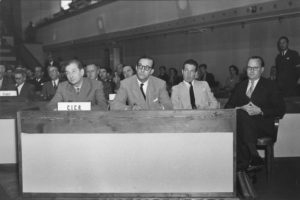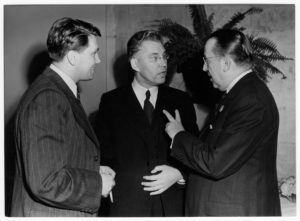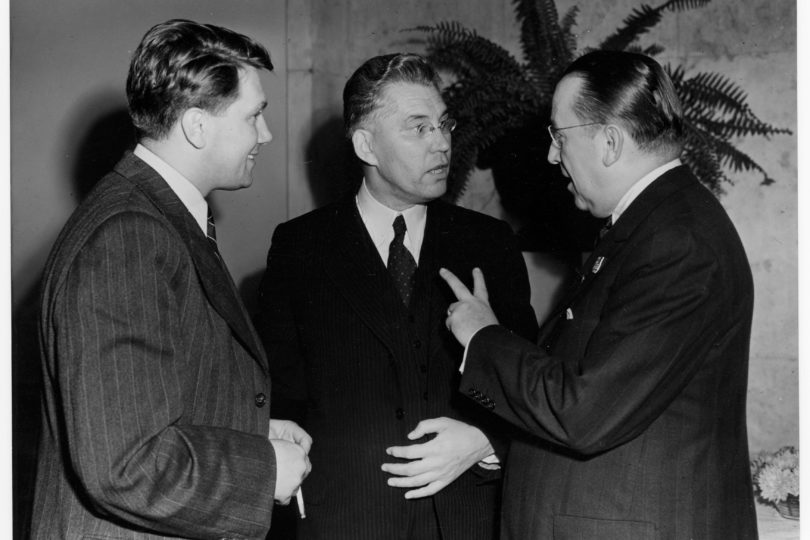Editor’s Note: Boyd van Dijk’s article, “‘The Great Humanitarian’: The Soviet Union, the International Committee of the Red Cross, and the Geneva Conventions of 1949”appears in Law and History Review 37 no. 1 (March, 2019). He discusses his findings and the process of archival discovery here.
This article analyzing the Soviet role in the making of the 1949 Geneva Conventions almost never came to be. The idea of unpacking several misconceptions within the existing literature regarding the Soviet contributions to humanitarian law’s genesis initially appeared like a difficult, if not impossible, hurdle to cross. At this early stage, I felt great reluctance to start writing a piece about the unique Soviet impact on the Conventions’ genesis for fear of working in what was, for me, the uncharted (and demarcated) territory of Soviet legal history. I had taken classes in Soviet studies and legal history and written a book about Nazi history, but I felt I lacked the extensive training necessary to study Eastern European history in depth. Though it is hard to imagine now, my article in the Law & History Review almost never existed due to this methodological concern about my perceived lack of expertise and access, as well as my fear of crossing heavily-guarded academic boundaries.
There was another way, however, I was told. At conference meetings, several Soviet historians mentioned alternative strategies to research Soviet legal history. But after rereading my archival materials on the making of the Conventions and the canonical texts of Soviet and post-colonial legal history, I was still reluctant to put my ideas on paper. As powerfully and extensively as my Western archival records discussed the Soviet role, I remained hesitant to say anything about the topic without having comprehensive and full linguistic access to Soviet archives, especially those held in today’s Russia.
A small breakthrough came when, after the Maidan Revolution, a brilliant colleague and her family helped me to acquire a collection of Ukrainian archival records. I realized what intellectual opportunities remained available to me after going through these unique records. In displaying new perspectives from the Soviet empire’s periphery, they enabled me to overcome some of my methodological problems caused by a lack of access to metropolitan Russian archives. No legal historian, to my knowledge, has ever studied those Ukrainian materials before. Gradually my original fear began to abate.
From Foe to Friend
Moscow rejected sending its delegates to a crucial preliminary drafting meeting in 1947. The Soviets contended that the ICRC had shifted, after 1945, from a “pro-fascist position” to serving the “interests of the bourgeoisie class,” particularly those of the “Anglo-American bloc.” They directly criticized its Swiss and bourgeois composition, alleged pro-fascist sympathies, and its “monopoly” over the revision process of the Conventions. This resistance caused French diplomats in particular to express serious concern about the Conventions’ future.

When the Soviets finally decided to come to Geneva in 1949, another historical puzzle occurred. In Swiss archives, I had found unique remarks of ICRC officials complimenting the Soviet drafting role at Geneva. The leading ICRC drafter Claude Pilloud admitted, for instance, that he “hardly dared to think what would have become of the Civilian Convention without the presence of [the Soviet] delegation.” Whereas the Soviets had previously tried to sideline the ICRC, calling it a proto-fascist organization, they now appeared to be their main allies at the drafting table amidst the burgeoning Cold War.
What had happened, I asked myself?

Even though in many other cases they were far less successful in shaping the negotiations’ final outcome, the Soviets did play a remarkably important role in creating the most important rules ever formulated for armed conflict−more so than is often recognized in existing accounts. One crucial reason for this success was the informal Soviet-ICRC strategic partnership and the initially fairly close cooperation between many of the Eastern and Western powers, creating major euphoria at the side of the Genevans, including Pilloud himself. As formerly occupied nations under Nazi rule, many Western European delegations wished to strictly limit the occupier’s powers, therefore often “uneasily support[-ing] [the] Soviet bloc to outvote the Anglo-Saxon countries,” complained a Commonwealth delegate afterwards. The Soviets played a transformative role in humanitarian law’s making, on several different levels.
These findings raised critical questions about our understanding of international legal history. For many, the Conventions are the product of liberal humanitarian thinking and a direct response to the experiences of World War II, which sought to prevent the repetition of its most horrific atrocities, especially against civilians. This classic account fails to acknowledge, however, the significant contributions of illiberal states, such as the Soviet Union and the socialist states of the Eastern Bloc, in developing humanitarian law. Indeed, challenging the notion that the Soviets failed to actively participate in the debate about revising wartime legal norms, the article shows how the Soviet bloc made a significant contribution to the law’s final product.
Taken altogether, it took an awfully long time to recover the history of lawmaking, and one of the hardest lessons I learned was the intellectual need to enter uncharted territories despite feeling your hands are tied behind your academic back. Indeed, there still exists enough work and materials for other scholars to explore and analyze in the coming decades. During this research I learned how little we know about internal divisions within the Eastern Bloc, Stalin’s instructions, or the perceptions of Arab and Asian delegates of Soviet anti-colonial politicking−all topics that raise more profound questions to examine for historians of international law, imperial history, and scholars of international relations studying global norm making.



 Boyd van Dijk is a lecturer in Modern European History at the University of Amsterdam. He is currently finishing his next book project, tentatively titled Preparing for War: The Making of the Geneva Conventions (Oxford University Press).
Boyd van Dijk is a lecturer in Modern European History at the University of Amsterdam. He is currently finishing his next book project, tentatively titled Preparing for War: The Making of the Geneva Conventions (Oxford University Press).